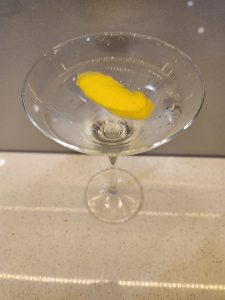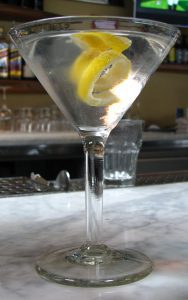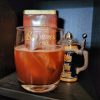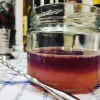 The Martini is a not so humble cocktail that is a total classic. Perhaps it’s the most well known cocktail out there, but it’s also very simple. The classic Gin Martini is just a mixture of Gin and Dry Vermouth. That’s it. It’s that simple! Similarly, the Vodka Martini is the same, just with Vodka. Sure, purists will tell you the a Vodka Martini isn’t a “true” Martini, but for the purposes of this article, we’re going to give it a pass. We have a whole section on this website for Martini inspired cocktails, and we’re sure there will be strong opinions on what was and wasn’t included. And we’re pretty liberal with it!
The Martini is a not so humble cocktail that is a total classic. Perhaps it’s the most well known cocktail out there, but it’s also very simple. The classic Gin Martini is just a mixture of Gin and Dry Vermouth. That’s it. It’s that simple! Similarly, the Vodka Martini is the same, just with Vodka. Sure, purists will tell you the a Vodka Martini isn’t a “true” Martini, but for the purposes of this article, we’re going to give it a pass. We have a whole section on this website for Martini inspired cocktails, and we’re sure there will be strong opinions on what was and wasn’t included. And we’re pretty liberal with it!
But however you define a Martini, we think everyone can agree that the classic Gin variety is great, as are the many spins and riffs on this relatively simple cocktail. The other fun thing about these variations is that many of them are almost as simple as the original. So, if you’re trying to find out what cocktail you can make with the ingredients you have, there will be plenty of recipes.
So come with us as we define what a Martini is and also talk about some of the different variations.
What Is A Martini?
 Strictly speaking, a Martini is a mixture of Gin and Dry Vermouth, often garnished with a twist of lemon or an olive. That’s all that it is. And that’s how it’s define by the International Bartenders Association. So this actually makes the Vodka Martini a variation.
Strictly speaking, a Martini is a mixture of Gin and Dry Vermouth, often garnished with a twist of lemon or an olive. That’s all that it is. And that’s how it’s define by the International Bartenders Association. So this actually makes the Vodka Martini a variation.
But like with the Daiquiri, the Martini has inspired countless variations. In a way, like the Moscow Mule, it has actually become more of a formula than just one cocktail (and if you’re interested, we also have an article on Moscow Mule variations).
And again, Martini purists will likely disagree with us, but we like to think of the Martini as a cocktail that (usually) uses Gin as a base and (usually) uses some kind of Vermouth to make it so you’re not just drinking straight Gin. After that, the key is subtlety. A Martini should have Gin at the forefront with any other ingredients designed to compliment it.
Of course there are exceptions to all of this, like the Porn Star Martini. This really breaks all the rules described and, while we’ve put the Porn Star Martini into the Martini section of our site, admittedly it strays far from the basic formula. It’s really a Martini in name only! And for similar reasons, the Espresso Martini isn’t really a Martini either. But hey, what’s in a name? These cocktails were obviously inspired by the classic Gin Martini, so we’ll let them stay.
Who Invented The Martini?
This is where things get a lot more contentious. There’s no clear history of who created the Martini or when.
Often the recipe for the first Martini is attributed to a man named Martini de Arma di Taggia who tended bar at the Knickerbocker Hotel in New York. Legend has it Taggia invented the Martini in 1911 for John B. Rockerfeller. Maybe this did happen, but it also ignores what came before.
With this in mind, it may not be a person with the first name Martini who came up with the name at all, but the brand of Vermouth. After all, it’s likely that Martini brand Vermouth came before the cocktail itself. But once again, that ignores what came before.
And what came before was likely the Martinez, a recipe that maybe doesn’t look like a Martini, but is widely regarded as coming first and was mainly a combination of Gin and Sweet Vermouth.
Later recipes for things called a Martini had relatively ample helpings of Gin and Vermouth, usually in equal portions. This likely evolved into the Dry Martini that we know today.
All of this is to say that no cocktail is invented in a vacuum. Something always comes from something else and, while someone likely did a certain variation on something else first, they’re likely either inspired by another cocktail or were substituting or removing an ingredient due to necessity.
Great Martini Variations
We’ve already mentioned more than a few variations on the Martini, but we’ll cover a few more, just for good measure. While we’re usually pretty open to cocktails calling themselves a Martini, we’re going to be a bit stricter here: cocktails with fewer ingredients that let the Gin do the talking!
Martinez
 We’ve already talked about the Martinez cocktail, but any list of Martini variations would be amiss without the Martinez! As mentioned, the Martinez is likely the inspiration behind the Martini, at least partly so. Looking at the recipe, you’ll see that there’s just as much Sweet Vermouth as Gin, so it’s kind of breaking the rule that the recipe should be Gin forward. That being said, this cocktail recipe is pretty old, and it comes from a time when cocktails often leaned a bit sweeter. If you’re interested in Martinis and their history, you really need to make yourself a Martinez!
We’ve already talked about the Martinez cocktail, but any list of Martini variations would be amiss without the Martinez! As mentioned, the Martinez is likely the inspiration behind the Martini, at least partly so. Looking at the recipe, you’ll see that there’s just as much Sweet Vermouth as Gin, so it’s kind of breaking the rule that the recipe should be Gin forward. That being said, this cocktail recipe is pretty old, and it comes from a time when cocktails often leaned a bit sweeter. If you’re interested in Martinis and their history, you really need to make yourself a Martinez!
Vesper
 While James Bond is is more famous for having his Martini “shaken, not stirred,” it’s the Vesper that really put him on the map when it comes to cocktails. The Vesper is mostly Gin, but also uses Vodka and replaces the standard Dry Vermouth with Lillet Blanc, which is similar, but an ingredient all its own.
While James Bond is is more famous for having his Martini “shaken, not stirred,” it’s the Vesper that really put him on the map when it comes to cocktails. The Vesper is mostly Gin, but also uses Vodka and replaces the standard Dry Vermouth with Lillet Blanc, which is similar, but an ingredient all its own.
The Vesper is a cocktail entirely invented by Ian Flemming in Bond’s first adventure, Casino Royale.
The Vesper is an interesting cocktail. The use of Lillet Blanc is an interesting choice that gives the cocktail a slightly different flavour. While there’s plenty of Gin, the Vodka is pretty much there to add more alcohol without much more flavour, allowing the Littet Blanc to come through without being taken over the Gin. Fun indeed!
Reverse Martini
 Breaking the rules again, but it’s the exact same ingredients, just in different ratios! The Reverse Martini is a super wet Martini that inverts the amount of Gin with the amount of Vermouth. If you’re a lover of Vermouth but want to enjoy a bit more of a kick, the Reverse Martini is for you!
Breaking the rules again, but it’s the exact same ingredients, just in different ratios! The Reverse Martini is a super wet Martini that inverts the amount of Gin with the amount of Vermouth. If you’re a lover of Vermouth but want to enjoy a bit more of a kick, the Reverse Martini is for you!
The whole reverse “thing” isn’t unique to the Martini though. It’s a fun variations that bartenders do for any cocktail that mostly just pure spirit with Vermouth added to soften it. See the Reverse Manhattan for example.
A similar variation, which we won’t list separately, is the Perfect Martini. This is another standard variation of any cocktail recipe that is based on spirit and Dry Vermouth, with the term “perfect” referring to using both Dry and Sweet Vermouth.
Turf Club
 The Turf Club cocktail stays pretty faithful to the classic Martini recipe while also having some similarity to the Martinez thanks to the addition of the Maraschino Liqueur. That being said, it’s likely the Turf Club pre-dated the Martini, so perhaps the evolution went Martinez, Turf Club, Martini!
The Turf Club cocktail stays pretty faithful to the classic Martini recipe while also having some similarity to the Martinez thanks to the addition of the Maraschino Liqueur. That being said, it’s likely the Turf Club pre-dated the Martini, so perhaps the evolution went Martinez, Turf Club, Martini!
As with a lot of older cocktail recipes, the Turf Club not only uses Maraschino Liqueur (as mentioned) as well as a rinse of Absinthe. These ingredients were popular at the time, and they make for a great old style cocktail.
Once again, if you’re on a Martini journey and you want to see how this classic but simple cocktail involved, make a stop at the Turf Club to see what was probably another inspirational recipe.
Tuxedo No. 2
 We’ll end this list of Martini variations with the Tuxedo No. 2, which we’re sure you’ll find similar to the Turf Club. We’re not sure if one was inspired by the other or if they were both created around the same time but just in isolation, but the Tuxedo No. 2 is another likely contender in the evolution of the Martini that we all know and love today.
We’ll end this list of Martini variations with the Tuxedo No. 2, which we’re sure you’ll find similar to the Turf Club. We’re not sure if one was inspired by the other or if they were both created around the same time but just in isolation, but the Tuxedo No. 2 is another likely contender in the evolution of the Martini that we all know and love today.
What’s also interesting about the Tuxedo No. 2 is that it uses Bianco Vermouth rather than Sweet or Dry Vermouth. Yes, Bianco is on the drier side, but it is sweeter than Dry Vermouth. Maybe that how the Vermouth used moved from Sweet Vermouth in the Martinez to the Dry Vermouth in the Turf Club and eventually the Martini. That’s all just conjecture though, as the full history of all these recipes is shrouded in mystery.
What’s Your Favourite?
Beyond the five Martini variations that we properly listed, we’ve also linked to more than a few other great Martini inspired cocktails! There are quite a few recipes to choose from!
Perhaps you shouldn’t sit down and drink all of these cocktails in one sitting, but it would still be fun to experience them all. Do you have a favourite? We’d love to know!
Cocktails with similar ingredients:
No similar cocktails.






